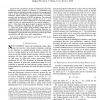Free Online Productivity Tools
i2Speak
i2Symbol
i2OCR
iTex2Img
iWeb2Print
iWeb2Shot
i2Type
iPdf2Split
iPdf2Merge
i2Bopomofo
i2Arabic
i2Style
i2Image
i2PDF
iLatex2Rtf
Sci2ools
128
click to vote
TCOM
2008
2008
MPSK modulated constellation design for differential space-time modulation
The constellation design for differential space-time modulation usually requires to construct L (constellation size) unitary matrices making the design complexity increasing rapidly with L. In this correspondence, we propose a new construction technique, which exploits the rotational invariance of unitary matrices and the property of MPSK modulation. The proposed constellations are derivable from a smaller set of D = L/M unitary matrices (via rotations defined by an M-ary PSK symbol) which, in turn, are parameterized by two unitary matrices U1 and U2. They share some good property of group constellations thereby considerably simplifying the optimization of U1 and U2. They also possess other good properties which allow for simplified maximum likelihood (ML) decoding. Extensive numerical examples are presented to demonstrate that the proposed constellations in general have larger diversity products than other constellations and thus, better error performance.
Related Content
| Added | 15 Dec 2010 |
| Updated | 15 Dec 2010 |
| Type | Journal |
| Year | 2008 |
| Where | TCOM |
| Authors | Qinghua Shi, Q. T. Zhang |
Comments (0)

